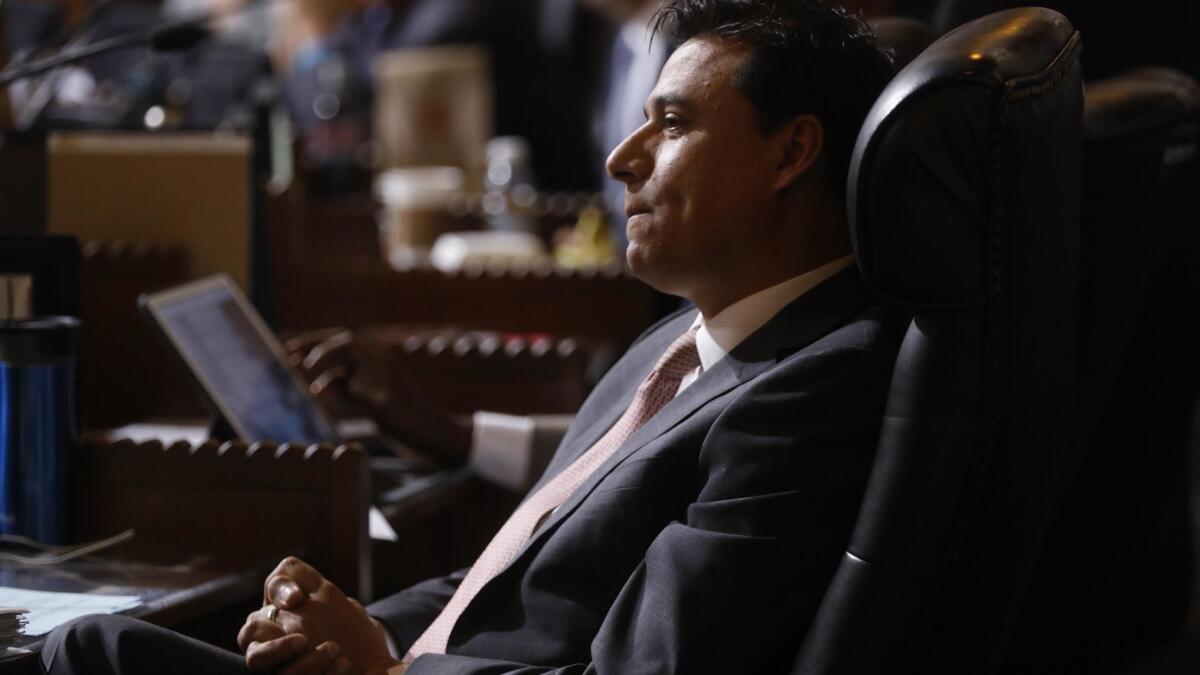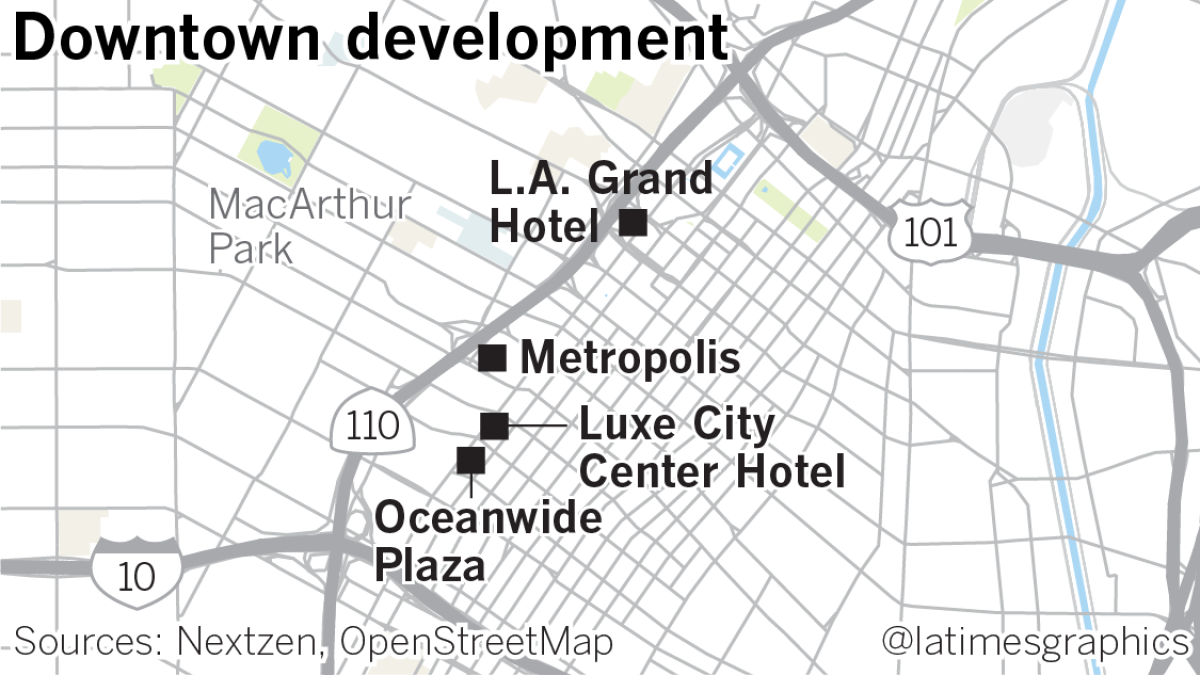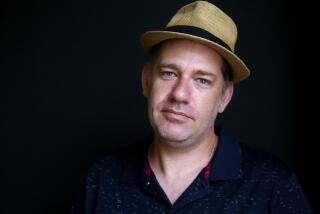FBI corruption probe of L.A. City Hall focuses on downtown development boom

The rapid transformation of downtown Los Angeles’ skyline is being fueled in good measure by huge investments from Chinese companies eager to burnish their global brands and capitalize on L.A.’s real estate boom.
Now some of those projects have become a focus of federal agents seeking evidence of possible bribery, extortion, money laundering and other crimes as part of a corruption investigation at City Hall.
Federal investigators have cast a wide net for information about foreign investment in Los Angeles real estate development, according to a search warrant that names an array of political and business figures.
Among those named are executives of Chinese firms bankrolling two ambitious downtown projects that would result in three new towers on Figueroa Street. Investigators are also seeking records about L.A. development projects involving other foreign investors, including firms with large-scale hotel and residential projects in downtown.
The warrant does not say the FBI has gathered evidence of criminal activity by any of the people or companies named in the document. No one has been arrested or charged in the investigation.
The federal investigation became public in November, when FBI agents descended on the home and offices of L.A. City Councilman Jose Huizar, who represents the vast majority of downtown. Since then, The Times has reported that investigators have sought records involving a longtime lobbyist and a fundraiser close to City Hall.
The warrant, which was filed in federal court in November but reviewed by The Times this weekend, sheds new light on the investigation and shows federal investigators are seeking records related not only to Huizar but also other City Hall officials, including Councilman Curren Price and current or former aides to Huizar, Council President Herb Wesson and Mayor Eric Garcetti.
Until recently, Huizar headed the powerful council committee that vets development projects. Price, in turn, heads a council committee focused on economic development, which reviews taxpayer subsidies offered by the city to hotel developers in and around downtown.

The warrant is not the only sign of FBI interest in L.A. development.
In recent months, real estate developers with projects in Huizar’s downtown-to-Eagle Rock district have received federal grand jury subpoenas instructing them to turn over communications with the councilman and dozens of current and former Huizar staffers since 2013, according to two sources familiar with the FBI’s instructions.
Those developers also have been told to provide information on any contributions they have made to Huizar’s reelection bid, his officeholder committee, any legal defense fund or his alma mater, Bishop Mora Salesian High School, the sources said. The subpoenas seek information on any donations made to two political committees with ties to Huizar — Community Support PAC and Families for a Better Los Angeles.
Developers in Huizar’s district also have been instructed to provide information on any gifts, meals, trips, vacations, flights, event tickets or rounds of golf they have provided to Huizar, his staff or any other council member, the sources said.
Among the information sought in the warrant were records related to trips to Las Vegas and stays at four hotels, including the Palazzo and Caesars Palace. The document does not explain why investigators want them.
Depending on where it goes, the FBI investigation could spur Angelenos to demand reforms of real estate development and campaign contributions and gifts at City Hall, said Kathay Feng, who was until recently the head of California Common Cause, a watchdog group that monitors ethics and money in politics.
“People already have a level of skepticism about how City Hall decisions are made around major development projects,” she said.
In the warrant, agents sought information from Google about a Gmail account tied to Ray Chan, a former deputy mayor for economic development for Garcetti who once headed the city building department and has worked since then as a consultant. Agents said they were looking for evidence related to an investigation into bribery, extortion, money laundering and other crimes that could involve more than a dozen people.
Among those named were two executives linked to Shenzhen New World Group, a Chinese company that has unveiled plans to redevelop the L.A. Grand Hotel downtown with a 77-story tower and build a 31-story hotel near Universal Studios.
The Times was unable to reach Wei Huang, president of Shenzhen New World Group, and Ricky Zheng, who was identified in state campaign contribution records as a Shenzhen New World LLC executive. Besides evidence of any possible crimes involving the two men, the federal warrant sought records relating to Shenzhen New World Group and two of its hotels.
The warrant, first reported by George Washington University counterterrorism expert Seamus Hughes, also named Fuer Yuan, founder of another company called Shenzhen Hazens. In 2017, the City Council approved a Shenzhen Hazens project on Figueroa Street, allowing the developer to demolish the nine-story Luxe City Center Hotel and replace it with two skyscrapers, one for a hotel, the other for condominiums.
As part of the approval process, the developer signed an agreement to contribute to initiatives long backed by Huizar, including $750,000 to support a planned downtown streetcar and $550,000 to the effort to revitalize the Broadway corridor.
Investigators asked in the warrant about the Luxe Hotel and George Chiang, who city records indicate was involved with the skyscraper project. David Chaiken, a company attorney, told The Times that Shenzhen Hazens was unable to share any information about its activities or the investigation.
The warrant said investigators sought evidence of possible crimes involving City Hall figures in addition to Huizar, including his planning deputy, Shawn Kuk, and his former aide George Esparza; Price; Deron Williams, chief of staff to Wesson; Joel Jacinto, a Garcetti appointee who serves on the city’s Board of Public Works; and Chan himself.
Garcetti spokesman Alex Comisar declined to comment on Jacinto or Chan. He said no one in the mayor’s office has received a federal subpoena or a less formal request for information from the FBI.
Esparza said in an email that he left Huizar’s office a year ago because he was “profoundly uncomfortable with some of Huizar’s practices and conduct.”
“As Huizar’s special assistant, I was in one of the best positions to see how the council member wielded his political power in ways in which, while he apparently had normalized, I did not feel aligned with how I wanted to live my political and personal life,” wrote Esparza, who now works as chief of staff to Assemblywoman Wendy Carrillo (D-Los Angeles.)
“So I got out before I became collateral damage,” he continued. “And I took steps to protect myself. Now I work for someone that does it the right way.”
Esparza did not directly answer questions from The Times about whether he observed, or participated in, any unlawful acts.
Attorneys for Huizar said he is focused on serving his constituents but did not address the content of the warrant.
Kuk, who handles development issues for Huizar, declined to comment. Price and Jacinto said they were unaware of the warrant when contacted by The Times on Saturday. Ed Johnson, assistant chief deputy to Wesson, said Sunday that federal investigators had not contacted their office about “any of this.”
Chan, the former Garcetti deputy, declined to comment in November about whether he had received a subpoena. At the time, he said he was a consultant working for CCC Investment Group, a company that listed George Chiang as its executive director in a state filing. Chiang had no comment, referring questions to his lawyer, and Chan did not respond to messages left by The Times.
Investigators also asked in the warrant for any records from the Gmail account related to projects with foreign investors, including Hazens, Oceanwide and Greenland.
Greenland is developing the Metropolis project downtown along the 110 Freeway. More than four years ago, Huizar and the rest of the City Council voted to grant as much as $18.7 million in financial aid to the Hotel Indigo, which is part of the project.
Oceanwide is developing two towers across from Staples Center that would include hundreds of condominiums and a Park Hyatt hotel. The warrant sought records for projects that Huizar, his staff and other named individuals helped to get city permits or other approvals, as well as records of fundraising for campaigns and other causes.
Times staff writer Joel Rubin contributed to this report.
More to Read
Sign up for Essential California
The most important California stories and recommendations in your inbox every morning.
You may occasionally receive promotional content from the Los Angeles Times.












